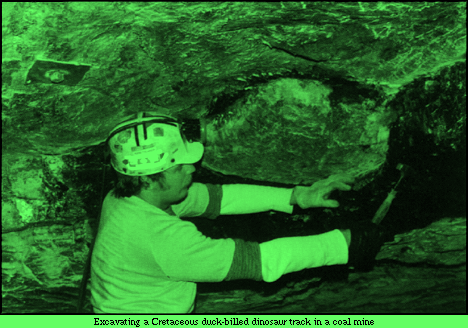|
It happened one day about noon ... I stood like one thunder-
struck, or as if I had seen an apparition ... for there was exactly the print of a foot - toes, heel and every part of a foot. - Daniel Defoe, Robinson Crusoe (1719)
|
 
|
There is always the chance of discovering dinosaur tracks by sheer luck. After all, they are often large and conspicuous and would be hard to miss on the right rocky outcrop. Of course, such an outcrop would have to represent sedimentary rock deposited in a continental environment during the Age of Dinosaurs. Such rock can be found anywhere - in mountains, river valleys, mines, quarries, in road cuts, or along sea cliffs. Many fossil footprints discoveries have been made in rural or remote areas by local people who lack any formal paleontological training. The first dinosaur tracks ever found were found this way, in 1802, when Pliny Moody of South Hadley, Massachusetts, ploughed them up on the family farm.1 He and his contemporaries believed them to be bird tracks. Other tracks are discovered as the by-product of rock-quarrying operations, rather than by pure chance. An example would be the abundant dinosaur tracks discovered in coal mines throughout Colorado and Utah.2 1. These Early Jurassic tracks later became the subject of intensive study by Edward Hitchcock, the world's first serious student of vertebrate tracks. Hitchcock, E. 1858. Ichnology of New England. A Report on the Sandstone of the Connecticut Valley, Especially Its Fossil Footmarks. Boston: W. White, 232 pp., 60 pls.
| |||